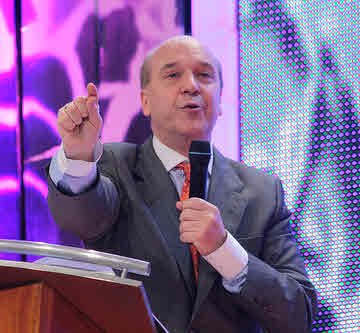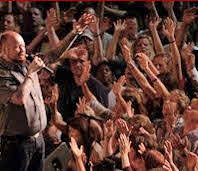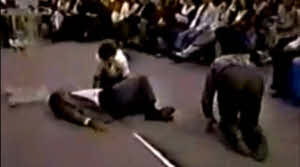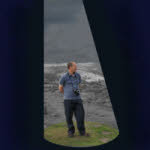Is falling backwards, being slain in the Spirit and uncontrollable laughing biblical?
The Toronto Blessing started in the Toronto Airport Vineyard Fellowship in January 1994 where the meetings were filled with people crying, uncontrollably laughing, shrieking, shaking, falling over, twitching, and trance-like states.
Is this a work of the Holy Spirit or a deception?
Here we look at a brief history of the Charismatic Movement from the 1960s and leading into the 1980s with the Third Wave of the Holy Spirit, known as the Neo-charismatic movement, and into the Toronto Blessing and looking at its fruit.
Table of Contents:
1. What was, and is, the Toronto Blessing?
The Toronto Blessing is also known as ‘The Father’s Blessing’, ‘the Renewal,’ or ‘Catch the Fire’ which was also called the laughing revival.
Is it God the Father blessing churches, or is it a renewal or revival of the church?
Or is it a movement focused on people and not God Himself?
Have the churches become lifeless so we need to ‘Catch the Fire’ of the Holy Spirit moving?
The Toronto Blessing has been a bit of a ‘Marmite’ experience for Christians.
Are we wrong to question these things?
The Methodist Church made a statement:
The ‘Toronto Blessing’ has not been without controversy.
1995 Methodist Conference Statement 1
Although its leaders have been at pains to point out that it is the resulting fruit of the Holy Spirit that is of prime importance it is the manifestations that have caused concern.
As might be expected there has been trenchant criticism from those who have never been able to accept the claims and teachings of Pentecostals and charismatics.
However concern has also been expressed by a number of senior figures from within Pentecostal and charismatic circles who have sought to adopt a Gamaliel-style approach (Acts 5:34-39), waiting and seeing ‘if this is of God’.
It is apparent that to some extent, the manifestations are, with time, becoming less frequent and less pronounced than at first.
In December 1995 the Toronto Airport Fellowship agreed to part company with the Association of Vineyard Churches which had felt it necessary to question the teaching and administration of the ‘Blessing’ in Toronto and stating that it could not accept attempts to give ‘theological justification or biblical proof-texting for . . . exotic practices that are extra-biblical.’… ”
2. How did the Laughing Revival start in Toronto?
In January 1994, a Pentecostal pastor named Randy Clark spoke at the Toronto Airport Vineyard Fellowship and gave his testimony of how he would get “drunk” in the Spirit and laugh uncontrollably.
In response to this testimony, the congregation burst into laughing, shrieking, shaking, falling over, growling, dancing, making animal noises, etc.
This phenomenon was interpreted as an outpouring of the Holy Spirit and was given names such as; the Father’s Blessing, catching the Fire, and the Church’s renewal.
The pastor of the church, John Arnott, referred to it as a big Holy Spirit party.
Many church leaders, who were dissatisfied with the dryness of their churches, heard about this outpouring and they went to see what was going on.
The ‘anointing’ was then passed onto them and spread out around the world where similar things happened.
3. What was going on before the Toronto Blessing, the Father’s Blessing?
The ‘Toronto Blessing’ is not a unique phenomenon.

Below is the Toronto Blessing beginnings, a potted history extracted from a manuscript by Margaret M. Poloma from the University of Akron 3 :
- Pre-1987 Claudio Friedzon, an Assemblies of God pastor in Argentina, was in the centre of a revival sweeping through parts of Latin America.
- In 1987 Howard-Browne brought the ‘laughing revival’ to the United States from South Africa and gave an ‘impartation of spiritual anointing’ to Claudio Friedzon and many other well-known charismatic ministers including Kenneth Copeland, Karl Strader, Bud Williams, Oral Roberts, Charles and Frances Hunter, and Kenneth Hagin.
- In 1993 November, Toronto Airport Christian Fellowship’s senior pastor John Arnott travelled to Argentina for a conference where he was prayed for by Claudio Friedzon and received an ‘anointing’.
- This resulted in a brief experience of some manifestations back in Toronto.
- In 1994 January, Randy Clark (who received his ‘impartation’ from Rodney Howard-Browne at Rhema Bible Church in Tulsa) spoke at the Toronto Church and what resulted is now known as the ‘Toronto Blessing’ or ‘Father’s Blessing’.
- Later in 1994, The Toronto Airport Vineyard was disfellowshipped from the Association of Vineyard Churches (AVC) for straying into things such as ‘holy laughter’ and the ‘golden sword prophecy.’ 4

Following this ‘disfellowshipping’ Margaret M. Poloma then wrote that the Toronto Airport Christian Fellowship:
was set free to sail the larger sea of Christianity, no longer tied to the restrictions and prohibitions increasingly being set in place by the AVC.
Margaret M. Poloma 5
(The AVC reportedly wanted to pitch its tents more securely within the evangelical campground rather than with charismatics, and its leaders felt the pressure of the mounting evangelical criticism of the ‘Toronto Blessing’.)
While these restrictions sometimes threatened the free flow of charisma, they also provided the very institutional matrix that allowed the ‘Toronto Blessing’ to develop as more than a charismatic wildfire that was out of control.
This dismissal caused the Airport Church to form closer bonds with some of its remaining allies and led to the establishment of Partners in Harvest, a group of former Vineyards and independent churches that have been impacted by the ‘Toronto Blessing’ “
This has been included in my articles as a reference – I make no comment on its content.
4. Toronto Blessing review when it started to be manifested in local churches (early 1990s).
The Toronto Blessing, a term coined by British newspapers, refers to the Christian revival and associated phenomena that began in January 1994 at the Toronto Airport Vineyard church (TAV), which was renamed in 1996 to Toronto Airport Christian Fellowship (TACF) and then later in 2010 renamed to Catch the Fire Toronto.”
‘Toronto Blessing’ Wikipedia 6
When the ‘Toronto Blessing’ hit the scene, I had recently moved and was involved in a House Church (British New Church Movement) of a hundred or so members.
The loose term ‘House Churches’ was used for all the new churches that met independently from established denominations, even when they met in schools, Town Halls, etc.
The worship, prayer meetings and home groups were already God-centred and lively.

The main part of the Sunday Services remained similar in style but would go into a time of praying for people to receive the blessing.
This would result in such things as people falling over, laughing uncontrollably, crying, shrieking, shaking, crawling or lying on the floor, peculiar movements, crying out, animal noises – barking, chicken noises, roaring, crowing, etc.
The prayer meetings would go straight into this phenomenon.
I was open to the true work of the Holy Spirit, but I just didn’t want to conform to peer pressure.
If anyone was not showing any signs of being ‘touched’ they were encouraged to ‘surrender and don’t resist’.
As I’ve said, I was open to God for Him to move, but I was feeling confused as to why the Lord would want to make anyone bark like a dog, etc, and the meetings did not seem to have any direction.
Also, other church services descended into chaos because the preacher couldn’t stop laughing and therefore there was no Bible teaching.
To me that was a real alarm bell – why would the Lord want to stop the preaching?
What happens with so-called Spirit outpourings without Bible teaching? What happened during the 18th Century Revival?
What happened during the 1950s Belgian Congo revival?
5. After the ‘Toronto Blessing’ (the mid-1990s):
At that time I was working in a high-pressure job with long hours and my personal life was facing a crisis, and spiritually I was unable to examine the whole episode and check it out with the Bible.
I think it is fair to say, that the fruit of the ‘Toronto Blessing’ upon our church was questionable.
Even though people would say that they had had an experience, the effect would be very short-lived.
Also, I was aware of no increase in the number of conversions.
After several years, I left that church and started to attend a more local one.
In all my years in Charismatic circles I had experienced the baptism of the Holy Spirit, fillings, and being touched by God, but the whole ‘Toronto Blessing’ left me feeling confused and uncomfortable.
Robin McAlpine has written an excellent book on this subject called: ‘Post Charismatic: Where Are We Now? Where Have We Come From? Where Are We Going?’ 7
I am not saying that the Lord can’t perform miracles, or that He doesn’t pour out His Spirit upon people, or that His Presence won’t cause weeping or joy, because the disciples prayed:
…enable your servants to speak your word with great boldness. Stretch out your hand to heal and perform miraculous signs and wonders through the name of your holy servant Jesus.”
Acts 4:29-30 NIV
It has taken many years to feel that it is right to revisit and investigate this phenomenon.
For a balanced view and teaching on the gifts of the Holy Spirit see: The filling of the Holy Spirit adds nothing to our salvation, but it is a transforming event.
6. Is the Toronto Blessing continuing in a similar vein?
Premier Christianity wrote a report on the 20th anniversary of the Toronto Blessing along with 370 people gathered at Oasis Church, Colliers Wood, South London for the Partners in Harvest (PIH) event:
There are still loud reactions, laughter, yells, as the Holy Spirit touches people. Great delight when someone reports a healing.
’20 years on from Toronto, the Blessing continues in the UK’ By Roger Harper 8
And a slightly incongruous emphasis on loud, long and enthusiastic worship. People were encouraged by worship leaders to “jump into the river” in worship, making human effort more than being open to what comes.
It makes for a heartfelt atmosphere but isn’t as intimate or as Father-focused as the teaching…
In the UK, Alpha in Prisons would not have started without the Toronto Blessing, according to Sandy Millar, Vicar of Holy Trinity at the time.
Spirit Café, pioneered by a Partners in Harvest Church in Birmingham, is currently seeing many with New Age interests coming to Christian faith…
John and Carol Arnott are joined by many other leaders (including Bill Johnson of Bethel Church, California who “caught the fire” from Toronto) who seek to facilitate the river of the Holy Spirit to flow in every church.”
So, the Toronto Blessing continues and there are more articles that explore this in greater depth:
It was not easy to question what was going on during this ‘Laughing Revival’ because people were scared of criticising the Holy Spirit.
If people say that God is moving, we need to check out what the core focus is. Is it right, to be Bible-based or Spirit-led?
7. Frequently Asked Questions (FAQ)
Is the Toronto Blessing still happening?
The Toronto Blessing started in 1994.
John Arnott pastor of the Toronto Airport Vineyard Fellowship, now the Toronto Airport Christian Fellowship, and his wife Carol started Partners in Harvest (PIH) in 1996 to keep the ‘Father’s Blessing’ or ‘renewal’ going.
Partners in Harvest has contacts in 42 nations (2016) and provides training for new leaders.
Their partners include people like Bill Johnson of Bethel Church, California.
What are the Toronto Blessing leaders?
1) Howard-Browne brought the ‘laughing revival’ to the United States from South Africa in 1987 and the same year gave an ‘impartation of spiritual anointing’ to Claudio Friedzon (amongst others).
2) John Arnott pastor of the Toronto Airport Vineyard Fellowship church went to Argentina and was prayed for by Claudio Friedzon and received an ‘anointing’ in 1993.
3) Pentecostal pastor Randy Clark (who also received an ‘impartation’ from Rodney Howard-Browne) gave his testimony about getting “drunk” in the Spirit and laughing uncontrollably in January 1994
4) Vineyard Fellowship founder John Wimber expelled the Toronto Vineyard Fellowship and pastor John Arnott in 1995.
5) Therefore name changed to Toronto Airport Christian Fellowship.
6) About thirty Vineyard churches withdrew from the Vineyard Fellowship in agreement with John Arnott in 1995.
The Toronto Blessing is also known as ‘the Father’s Blessing’ or ‘the renewal’
References and credits – open in new tabs:
Image is licensed under the Creative Commons Attribution-Share Alike 3.0 Unported license. Wikipedia. ↩
Manuscript by Margaret M. Poloma. ↩
The Vineyard Movement. ↩
The “Toronto Blessing” and Church Structure, an article by Margaret Poloma. ↩
‘Post Charismatic: Where Are We Now? Where Have We Come From? Where Are We Going?’ by Robin McAlpine ↩
’20 years on from Toronto, the Blessing continues in the UK’ By Roger Harper Premier Christianity. 31 October 2016 ↩

